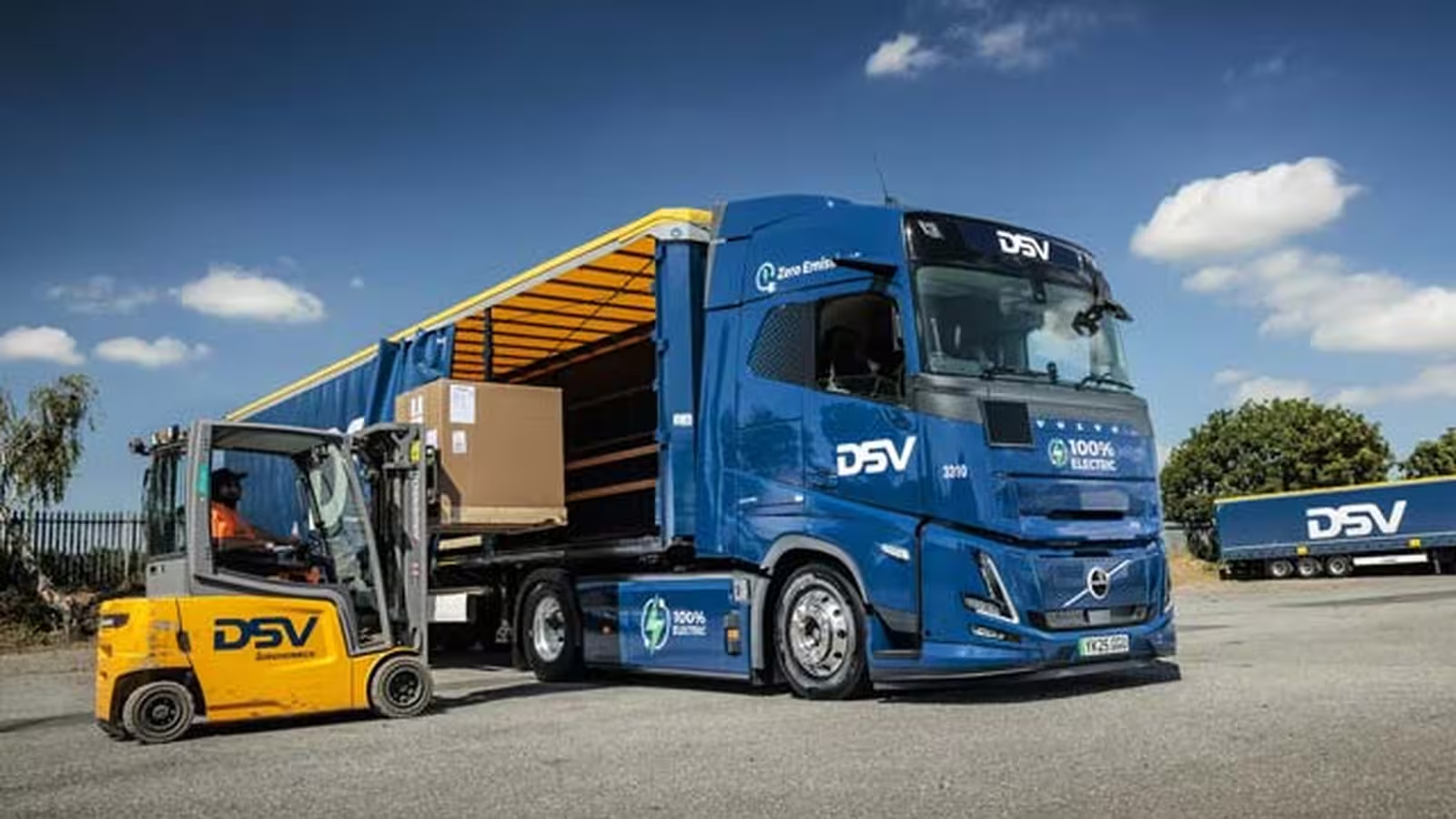5 Minutes
DSV adds Volvo FH Aero Electric to UK fleet
Transport and logistics specialist DSV has introduced four Volvo FH Aero Electric 4×2 tractor units into its UK operations—part of a wider commitment to buy more than 300 zero-exhaust-emission trucks from Volvo Trucks by 2026. Supplied through Alexandre Lopes, National Key Account Manager for Volvo Trucks UK & Ireland, these vehicles replace older diesel trucks on regional routes out of Immingham and immediately reduce carbon emissions while maintaining route performance.
Vehicle specifications
Battery, range and charging
Each FH Aero Electric at DSV is fitted with the full complement of six battery packs, delivering an estimated driving range of up to 300 km per charge. With a 250 kW DC charger, a full recharge can be achieved in roughly 2.5 hours—well suited for intensive regional operations and fast turnaround schedules.
Powertrain and performance
The electric FH Aero features three electric motors that together produce up to 666 hp and 2,400 Nm of continuous torque. The model retains Volvo’s standard I-Shift gearbox to ensure a familiar, smooth shift experience for drivers transitioning from diesel FH Aero trucks. These specifications deliver strong acceleration and hill performance while offering quieter operation and lower running costs compared with equivalent diesel units.
Design and energy efficiency
The FH Aero’s refined cab shape targets aerodynamic efficiency—critical for electric trucks where minimizing drag extends range and improves energy regeneration. Improved free-rolling behaviour enables more effective regenerative braking, capturing energy when decelerating or descending slopes and returning it to the batteries for subsequent acceleration. Volvo’s Camera Monitoring System (CMS) replaces traditional mirrors for both aerodynamic and safety gains: reduced drag, a broader field of view, reliable visibility in rain, darkness, tunnels and auto-panning when towing a trailer.
Driver comfort, safety and drivetrain aids
DSV specified a range of driver-focused options to ensure comfort and safety. The Globetrotter cab includes leather upholstery, a suspended heated driver’s seat with dual armrests, a 50 mm premium mattress protector, a 33-litre fridge and extra storage space. Steering and handling aids include Volvo Dynamic Steering for reduced driver fatigue, I-See predictive cruise control to optimise energy use on varying gradients, and full air suspension for ride comfort and load protection.
Active safety features are comprehensive: Forward Collision Warning with adaptive cruise control, Advanced Emergency Braking (AEB), Side Collision Support, Lane Keeping Support and Driver Alert Support form a layered safety suite that helps protect drivers, trailers and other road users.
Market positioning and fleet strategy
These four FH Aero Electrics are the first to enter operational service in the UK and support DSV’s larger sustainability strategy. The company plans to operate 2,000 electric vehicles by 2030 and the Volvo agreement also includes 500 trucks with highly fuel-efficient diesel and gas drivetrains—reflecting a pragmatic transition strategy that mixes zero-emission and low-emission powertrains based on route requirements.
Service, uptime and comparisons
To ensure high availability, DSV benefits from a five-year Volvo Gold Contract that covers maintenance and repairs, including proactive battery monitoring. Compared with diesel FH Aero models, the electric variant lowers onsite emissions and noise while offering competitive range and performance for regional haulage. Against competitor electric trucks, Volvo’s FH Aero Electric stands out for its combination of aerodynamic design, three-motor powertrain, rapid charging capability and the manufacturer’s established support network—important factors for large fleet operators evaluating total cost of ownership and operational uptime.
Conclusion
By deploying these initial FH Aero Electrics, DSV demonstrates how electric heavy trucks can be integrated into everyday logistics operations without sacrificing payload capability, driver comfort or service levels. For fleet managers and car and commercial-vehicle enthusiasts, the move highlights the growing maturity of electric truck technology—where range, charging speed, aerodynamics and manufacturer support increasingly make zero-emission trucks a viable alternative for regional and national transport.
Source: electriccarsreport


Leave a Comment